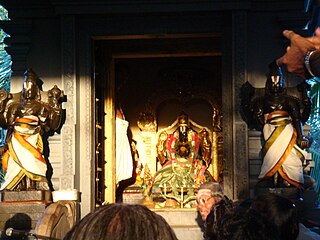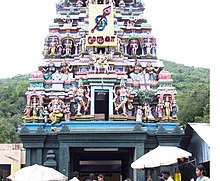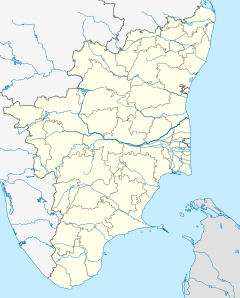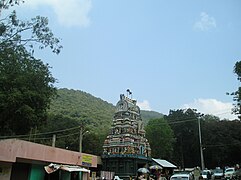
Avvaiyar was the title of more than one female poet who were active during different periods of Tamil literature. They were some of the most famous and important female poets of the Tamil canon.

Palani is a town and a taluk headquarters in Dindigul district of the Indian state of Tamil Nadu. It is located about 100 kilometres (62 mi) south-east of Coimbatore, 100 kilometres (62 mi) north-west of Madurai, and 67 kilometres (42 mi) from Kodaikanal. The Palani Murugan Temple or Arulmigu Kulazhandaivelayutha Swamy Temple, dedicated to Lord Murugan is situated on a hill overlooking the town. The temple is visited by more than 7 million pilgrims each year. As of 2011, the town had a population of 70,467 which makes it the second largest town in the district after Dindigul.

Melur is a town and municipality in the Madurai North in the Indian state of Tamil Nadu. The name Melur name comes from "Mela Nadu". Melur is called Thaigramam. It is the biggest taluk within the Madurai District. As of 2011, the town had a population of 40,017. Melur is an agricultural land in Madurai and the climate around the area is tropical.

Tiruchendur is a panchayat town located in the southern tip of India, in the Thoothukudi district of Tamil Nadu. It is home to Thiruchendur Murugan Temple, also known as Arulmigu Subramaniaswamy Temple which is a Second Arupadai veedu and one of the ancient Hindu temples dedicated to Lord Muruga.. Tiruchendur is well-connected by road and rail with the rest of Tamil Nadu and India and the nearest railway station is Tiruchendur railway station. Tiruchendur is just 53 km from Tirunelveli.

Avvaiyar is a 1953 Indian Tamil-language historical drama film directed by Kothamangalam Subbu, and produced by S. S. Vasan. The film features K. B. Sundarambal and M. K. Radha in the lead roles.

Thiruporur is a panchayat town in Chengalpattu district in the Indian state of Tamil Nadu. The Thiruporur Kandaswamy temple is situated in the center of the town. There is a large temple tank in the vicinity of the temple. Thiruporur is located on Old Mahabalipuram Road and is flanked by Kelambakkam on one side and Alathur Pharmaceutical Industrial Estate on the other side, both of which are also on Old Mahabalipuram Road.

Thiruparankundram Murugan Temple or Subramanya Swamy Temple is a Hindu temple and one of the Six Abodes of Murugan, located at Thiruparankundram. The temple is built in rock-cut architecture and believed to have been built by the Pandyas during the 6th century. According to the legend it is where Murugan slayed the demon Surapadman and married Deivayanai, the divine daughter of the king of heaven, Indra, and he is said to have worshipped Shiva here as Parangirinathar.

Thiruthani Murugan temple is a Hindu temple, on the hill of Thiruttani, Tiruvallur district, Tamil Nadu, India, dedicated to Lord Muruga. The hill has 365 steps indicating 365 days of the year. It is one of the Arupadaiveedu, the six holy abodes of Lord Muruga. The other five are Palani Murugan Temple, Swamimalai Murugan Temple, Tirupparangunram Murugan Temple, Pazhamudircholai and Thiruchendur Murugan Temple. Thiruthani is 87 kilometres (54 mi) from Chennai.

Swamimalai Swaminathaswamy Temple is a Hindu temple dedicated to god Murugan. It is located in Swamimalai, 5 km from Kumbakonam, on the banks of a tributary of river Kaveri in Thanjavur District, 250 km from Chennai, the capital of Tamil Nadu, India. The temple is one of the six holy shrines of Murugan called Arupadaiveedu. The shrine of the presiding deity, Swaminathaswamy is located atop a 60 ft (18 m) hillock and the shrine of his mother Meenakshi (Parvathi) and father Shiva (Sundareswarar) is located downhill. The temple has three gopuram, three precincts and sixty steps and each one is named after the sixty Tamil years. The temple has six daily rituals at various times from 5:30 a.m. to 9 p.m., and three yearly festivals on its calendar. The annual Vaikasi Visagam festival is attended by thousands of devotees from far and near.

Arappalayam or Arapalayam is an area in the Madurai district of Tamil Nadu State, India. It is on the south bank of the River Vaigai. Arappalyam comes under the Madurai West constituency. The PIN Code for Arasaradi-Arappalaym is 625016.
Periyalvar, also known as Vishnucitta was one of the twelve alvar saints of South India, who are known for their affiliation to Vaishnava tradition of Hinduism. His name is also transliterated as Periyalwar, Periyazhwar, or Periyazhvar

Badri Narayanan temple is a Hindu temple in the Madurai District in the entrance of Alagar Koil in the state of Tamil Nadu, India.

Kanthan Karunai is a 1967 Indian Tamil-language mythological film, written and directed by A.P. Nagarajan. It features an ensemble cast including Sivaji Ganesan, Gemini Ganesan, Sivakumar, Savithri, K.R.Vijaya, Jayalalithaa, S. A. Ashokan, K. B. Sundarambal, Manorama and Nagesh.
Kumarakoil or Kumarakovil is a small village in Kanyakumari district. Here is the famous Subrahmanya (Muruga) Temple by the name of Velimalai Kumaraswamy Temple. The temple was built on a hill named 'Velimalai'. The name "Veli" was named from the Malayalam word "veli" means marriage.It is the place where marriage of Murugan and Valli was done. Koravans used to come to the temple for marriage of Valli, since Valli Devi belongs to Koravan community. Lord Muruga and his consort Goddess Valli are the main deities. It is believed that they married here. It is built on a rocky terrain about 200 feet in height.

The Six Abodes of Murugan are six temples situated in the state of Tamil Nadu in South India. The god is known by different names such as Kartikeya, Kanda, Vadivela and Muruga at various temples. The six most sacred abodes of Murugan was mentioned in Tamil sangam literature, "Thirumurugatrupadai", written by Nakkeerar and in "Thiruppugazh", written by Arunagirinathar. The six abodes are Palani, Thiruthani, Swamimalai, Pazhamudircholai, Thirupparankunram and Thiruchendur.
Madurapuram is a small village in India that lies on the banks of the Vaigai River and on the National Highway 49 that connects Madurai with Rameshwaram. The village is situated 18 kilometres (11 mi) from Madurai. Though Madapuram is near Madurai it is within Sivagangai district. The famous Madurapuram Badhrakali amman and ayyanar temple is situated at this place. Today this temple is managed by HR&CE ministry of Government of Tamil Nadu.

Sri Valli is a 1961 Tamil-language Hindu mythological film directed by T. R. Ramanna. A remake of the 1945 film of the same name, the film featured Sivaji Ganesan and Padmini in the lead supported by T. R. Mahalingam, E. R. Sahadevan, C. K. Saraswathi and J. P. Chandra Babu in other prominent roles. This film was taken in Gevacolor.
Sirivarpuri Balasubramani temple is a 500-year-old temple in Tamil Nadu.

Kallazhagar Temple in Alagar Koyil, a village in the South Indian state of Tamil Nadu, is dedicated to the Hindu god Vishnu. Constructed in the Dravidian style of architecture, the temple is glorified in the Divya Prabandha, the early medieval Tamil canon of the Azhwar saints from the 6th–9th centuries AD. It is one of the 108 Divyadesam dedicated to Vishnu, who is worshiped as Kallazhagar and his consort Lakshmi as Thirumamagal.

















